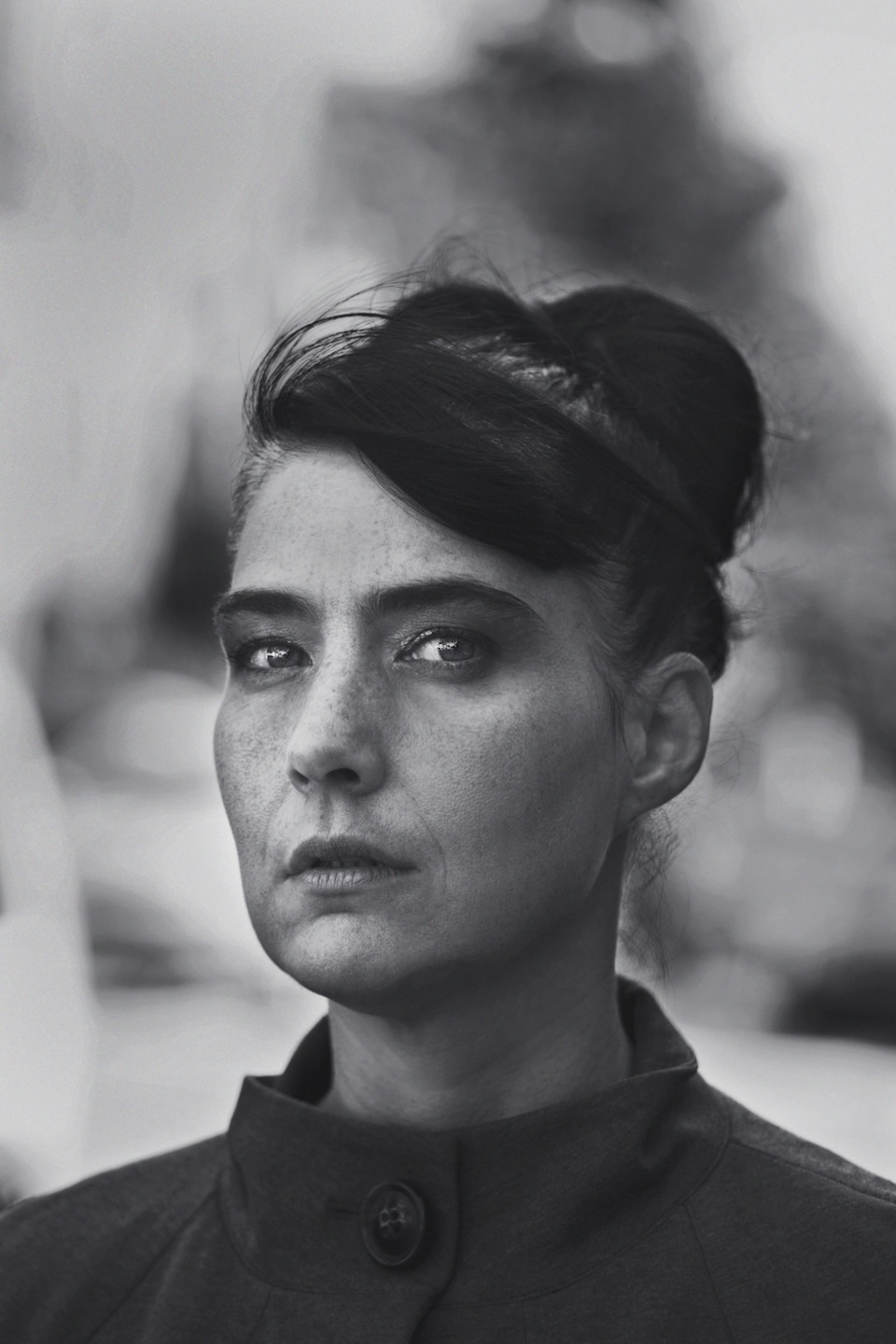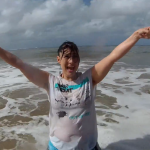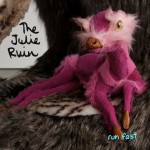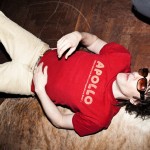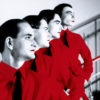Photos by Silja Magg
Interview by Michael Tedder
Making a new album just wasn’t possible for the past nine years. If it was, I probably would have put out five.
In 2004, I started to realize something was deeply wrong. I got sick a lot on the Le Tigre tour. I struggled through 2005, and then I held out hope that maybe I’d just been too stressed out. Maybe I was just getting older. I made a lot of excuses—“Oh, I picked this up from this person.” But I think it actually was when I went on a vacation to Hawaii and I got sick. I was like, “Who gets sick in Hawaii?”
I remember sitting in a beanbag chair and my husband was filming me. I said, “Wouldn’t it be weird if you were filming me and then later I died and you were watching this?” And he was like, “You’re fucked up!” He turned it off and was like, “You’re so no fun”…. I remember at that moment when I said it, something in my body was like…“Something is really wrong. You can’t fuck around anymore.”
My husband told me I should [make another record] so I’d have something to look forward to. Because I was really depressed. If you look at my output over the years, I didn’t make a thousand records, but I toured a lot. I put on art shows; I’ve done a lot of shit. And for me to be struck down was so hard. When you’re a Type A personality, it’s like, “Why can’t I control this? Why can’t I fix it?”
We live in a culture that tells us, “Oh, if you were just more positive, if you just changed your diet and got acupuncture, you’d be all better.” That’s bullshit. My feeling is, if you have late-stage Lyme disease, you better get some fuckin’ hardcore antibiotics because it’s like a form of cancer in a way.
So many people e-mailed me and said, “Antibiotics don’t work; just take herbs.” I was slurring my words and crawling to the bathroom before I got antibiotics, so fuck those people. That’s what worked for me.
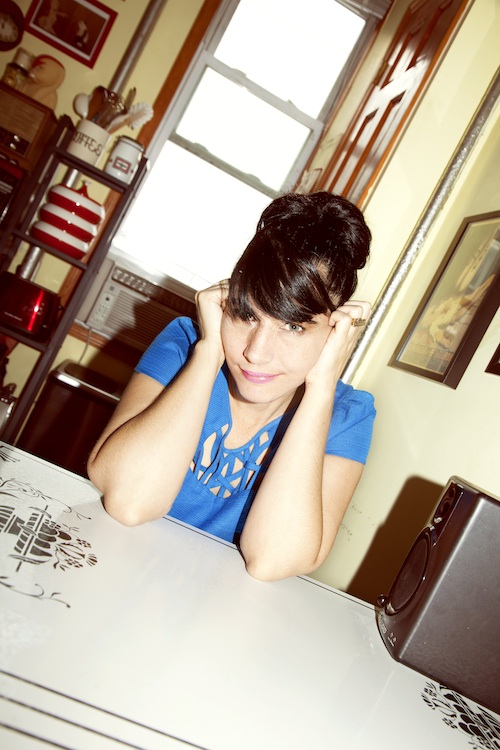
We started the band before I had the diagnosis. I told them, “I’m very sick.” At that time, they kept telling me I had all these different illnesses, and it looked like it could be the beginning of lupus. Every morning, I looked in the mirror and waited for this butterfly rash to appear on my face. Never did. I just figured, “Why not?” Just practice whenever I’m well. And they were super cool about it. It took us three years to finish the record because of that.
I very calculatedly asked each of them [to join the Julie Ruin] at times they couldn’t refuse. Like on my birthday… But I was really secretly afraid of being rejected. I couldn’t believe that they all said yes. After each yes, I would come home like I won the lottery. Because they’re all really good at what they do and really fun to hang out with. If you’re gonna be in a van with someone for 18 hours, you better like them. And they all have really good senses of humor and they don’t get stressed out about shit like a two-hour line at the Dollar Rent-a-Car.
I didn’t know what was going on for a very long time. Then I was being filmed for this movie about my life—The Punk Singer—when I was actually diagnosed. And what do you do? Put out a press release? Like, “I have Lyme Disease”?…I’m not Miley Cyrus, who, if she took a nine-year break, people’d be like, “What the fuck?!?” I didn’t feel like anybody cared. I just did this stuff I was doing, and I did it as much as I could with the limited brainwork that I had to work with.
I had a PICC line in my arm for nine months; that was pain. I actually sang some of the record with my whole [machine] next to me. I was very proud of working on the record while I was being given, like, huge doses of Cipro.
I had to wait until there were well days, so we had the mic set up at my house. It was really important that the record had a lot of energy to it. Partially because I would have about five days of energy a month…I didn’t want the record to sound like a sick person because I got back in touch with the part of me that isn’t the sick person.
I used to take my bra off and hang it on the IV pole at night. It’s hard to remember, “Oh, this isn’t all I am.” But so much of it is “What can I eat? What can I not eat?” I still have to take five huge pill cases a day, so you really just become… That’s all you are.
When I was singing, I was really who I am.
I have good days and bad days, good weeks and bad weeks. I’m still in treatment, so I do these weird stints of oral antibiotics that make me really sick. Other than that, I’m so much better. I can walk. I can talk.
“When it started to disintegrate, I was really depressed.
If I wasn’t the girl in Bikini Kill, I felt like I didn’t exist.”
I wouldn’t say I’m manipulative, but I’m a firm believer in using everything that you have. Like I love Castaway even though I hate Tom Hanks because he had to utilize everything he had in his suitcase…. I feel that way all the time. I don’t know why, but when I’m in a room with [the Julie Ruin], I’m like, “Okay, Carmine [Covelli] has an amazing tenor voice. How are we gonna use that? Sara [Landeau] and Kathi [Wilcox] can do really pretty girl-gang vocals. How are we gonna use that? Kenny [Mellman] has this real distinct laugh that can cut through anything deep. How we gonna use that?”
Being sick taught me that I don’t control the universe like I thought I did. I really had to check my ego at the door and stop thinking I was such a fucking big shot in my own head.
I gave myself this record. I gave myself having a good time with my friends and making whatever was gonna happen.
I don’t want to be in Bikini Kill Jr. Or Bikini Kill Sr. And I don’t want to be in Le Tigre: Part II. I wanted to be in this band.
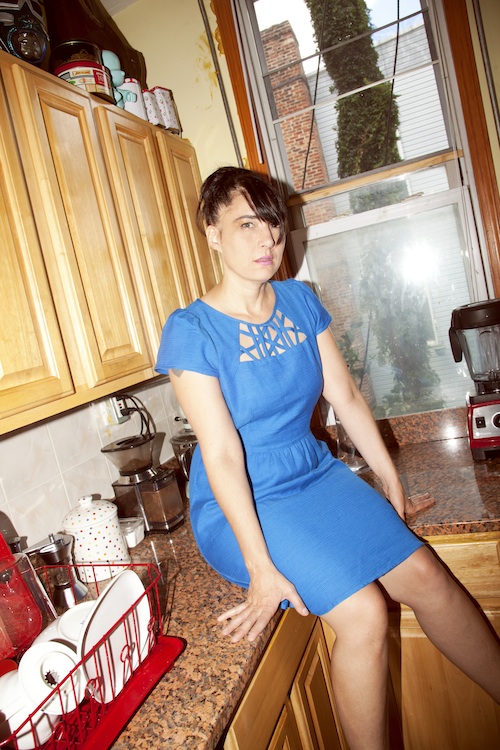
I wrote [the first Julie Ruin record] when Bikini Kill was still a band. I lived in Olympia, across the street from this shitty place called the Hardbodies Gym. It was horrible. But my apartment had these beautiful bay windows. Olympia is such a small town that a train would drive right in front of my window, and whenever my cat would hear the train sound, it would jump up on the table and the conductor would wave at him. That was the beautiful part of making a record those days.
Bikini Kill was very difficult. Not just because the four of us have very different personalities; the reception we got was very confusing. People either loved us or hated us in a way that bordered on violence…. In the big scheme of things, it’s not a big deal, but when you’re in your 20s and a total egomaniac, it’s “Oh, my god.”
I was frightened. It started feeling like it was ramping up to the point that some crazy person was going to shoot me onstage. I felt like everybody expected me to be this über-confident feminist and write these anthems, but I didn’t really know who I was anymore. I could tell my band was disintegrating, and…Bikini Kill was my entire life. I can’t stress how little of a life I had outside of that band…. If any relationship I had fucked with my band in any way, it was over, that day.
When it started to disintegrate, I was really depressed. If I wasn’t the girl in Bikini Kill, I felt like I didn’t exist. But I also hated being “the bitch man-hater from Bikini Kill,” so the Julie Ruin solo record was a way to discover who I was and try new things.
I was never very confident in the studio. In Bikini Kill, I would leave when they played my vocals, or that would be the one day a year where I’d smoke a pack of cigarettes in the alley. Recording in my apartment, trying different ways of singing and using a drum machine for the first time felt like a new beginning. I think that’s why the name carried over into the new band.
In ’89, when I started making music, it was horrible to get onstage and say, “This song is about rape.” I mean, horrible. Like men would yell really awful stuff…. It wasn’t, like, half women, half guys, or mixed in terms of social identity or anything. It was mainly just a bunch of white dudes. And saying, “This is a song about rape,” in front of them was just [in a Pee Wee Herman–type voice] not acceptableeeee!
The one, two or three women at the show would always come up to me afterward and be like, “I have something to tell you.” So many times, they would tell me their rape stories. And because I had been a volunteer at a rape-relief place, I kind of knew how to handle it…. To be able to be a support for that person and for that person to say, “I hear my voice inside your voice,” was incredibly gratifying as an artist. The bad reviews, the guy who spit beer in my face, the hate mail—it made it all worthwhile.
But it wasn’t a good time in the ’90s. It wasn’t “Oh, and then it was cool to be political.” Even with riot grrrl, there was so much backlash against it immediately. But I think amongst a certain group of young punks, feminism became cool to us. And that was what mattered.
If nostalgia is how people find things, that’s fine. I mean, I found out about punk rock on late-night TV, when Liquid Sky played. I lived in the suburbs; I was not a cool sophisti-cat. And if people are nostalgic for the ’90s and they find a Nirvana record, and through that they find out about the Vaselines and start digging through the crates as people are again, great. And if people want to think it was an awesome time and they want to thank me and want to say how great I am, I’ll take it because there weren’t a lot of people thanking me and telling me how great I am at the time in a public forum. But there were people behind the scenes who were. And they were the ones who kept me going.
I’m happy that it’s more normal to be a woman or a gay kid and be in a band and it’s not like, “Whoa! What?”
I think about it a lot more in terms of gay rights. The fact that transgendered issues are on the agenda—the fact there’s a “T” in [LGBT]—is so important. The fact that gay marriage is an international discussion? Wow. When I was growing up, there was no fucking way. I know many people find that assimilationist for lesbians and gays to get married. People can have their opinion, but I feel it’s a matter of civil rights that people have choices.
I try to look at the positive stuff. I’m not a politician.
I taught a graduate art class with Marlene McCarty at NYU. I had a guy that sat next to me on the first day and just drew pictures of penises on a piece of paper the whole entire time. He also got naked for one of his class projects, and I feel like he was really, like… His favorite artist was Damien Hirst. His whole thing was trying to shock me and Marlene because we’re feminist artists.
There was this one time we brought this feminist/Marxist text in, and some of the guys in the class were so offended by it. It was just writing, and we were going to discuss it. We’re grownups. Can we have a dialog? Tell me how you disagree with it. And it devolved into this really fucked-up conversation of how women actually got more attention in the art world for being women. I was just like, “No, no, no. We’re not having this conversation. We’re looking at the text and talking about the text,” but they acted as if the text was alive and it had knives and it was stabbing them in the face.
The fact that some of the men in the class were very upset by any feminist content was great because there’s sexism, racism and classism in every single room. When there’s the person who says something dimwitted like, “Oh, female artists get more attention than males because they’re women,” the sexism is obvious. “It’s in the room. Thank you for telling me.” And it’s the same way at shows that Bikini Kill used to play and some guy would yell, “Show us your tits,” or “Fuck you,” or “Shut up,” and it was like, “Okay, now we can’t pretend that sexism doesn’t exist in this room.”
I feel like I’m going from this really difficult part of my life into this really awesome part, and the next record is probably going to be super depressing. //
The Julie Ruin’s self-released debut album, Run Fast, is available now.
